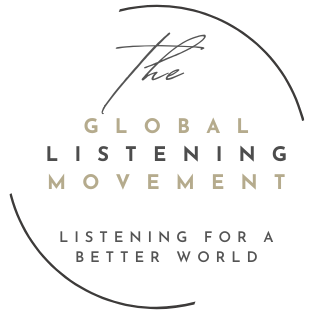By Marjoleine van Sinderen
It is not always easy to listen well. Corine Jansen wrote a beautiful blog ‘A good listener’ about that.
We may have two ears and one mouth, but we also have a lot on our plate. It is certainly not easy to
listen well when we are tired and have all sorts of things on our minds. Or when we are worried
about the speaker and are trying to help. Or when we think a solution needs to be found quickly but
have little time. Or when the outcome of the conversation has a huge impact on ourselves, our loved
ones or our business or jobs. It is challenging to listen when what the speaker is saying triggers our
fear or irritation. Depending on the situation and the person speaking, listening goes better some
times than others. Listening to a client is different from listening to our colleague, our partner, one of
our parents, our child or friend. Relationship and situation and how we feel physically affect how we
listen. Just try listening with a full bladder . Not so easy.
It’s ok that the quality of our listening varies. It helps me to keep in mind that I am working on it and
that I have the right intentions. It helps to be kind and forgiving to ourselves when our listening
diminishes.
What is Deep Listening anyway?
Deep listening is different from listening in a general social conversation or meeting. Usually there
are interruptions, feedback, opinions and questions for yourself to better understand the other
person or the topic. Deep listening is listening for the other person so that they understand
themselves better. Of course, as listeners, we learn and benefit from this and can build on it as long
as we don’t interrupt their deep thinking.
As listeners, by listening deeply, we create a safe space for a thinker to think (and feel) deeply, even
deeper than before and to think independently. ‘The quality of everything we do and feel, as human
beings, depends on the quality of the thinking we do first,’ says Nancy Kline of Time to Think. If the
thinker is helped to focus deeply then they can go to their core. That is where their deep truth is,
their deep knowing and feeling, their gold. Isn’t that amazing? Our listening stimulates great ideas,
insights, solutions, decisions in the thinker. If we listen very well, their ideas and insights can be too.
There is a direct connection. What impact can we have on the lives around us?
What can we do to listen well?
We can give our full attention to others. Listening without interruption and with an interest in where
the person will go next and next… and next. When I feel I am about to interrupt, I ask myself the
question: how do I know that what I am about to say is more interesting, more valuable, than what
the other person is going to think and say?
We will certainly have a reaction (a thought or feeling) to what the thinker is saying. There will be
times when our thoughts jump ahead or wander. It can help us to think of our mind as a whiteboard
and wipe away our thoughts and restore our focus.
It also helps me take time for myself, feel my body, my feet on the ground, follow my breath, feel the
rise and fall in my torso, so I can relax and restore my energy. Then I can listen inside and feel what is
going on inside me. It allows me to open up to others and listen deeply to them. It helps me connect
deeply with them and feel compassion.
There are many other aspects that help us listen well. Anyway, it takes practice in good times so that
we can listen in good times and in times when it is more challenging to listen. What helps you listen
well?
